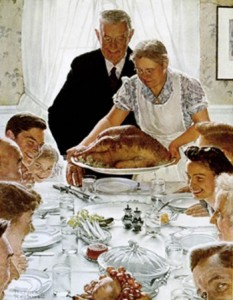The Origin of Thanksgiving
It is an annual national holiday in the United States, giving thanks for the harvest and other blessings of the past year. It was celebrated traditionally on the last Thursday in November and, by Act of Congress in 1941, appointed as a legal holiday, on the fourth Thursday of that month.
It originated in the autumn of 1621 when Plymouth Governor William Bradford invited neighbouring Indians -the Algonquins who had taught them how to plant corn and hunt wild turkey-to join the Pilgrims for a three-day festival of recreation and feasting in gratitude for the bounty of the season and in thankfulness for their first harvest in America after a year of struggle and privation. During these days, deer, wild turkey, goose, duck, fish and corn were eaten. It was only in the 18th century that the “first national Thanksgiving” was proclaimed, on Thursday, November 26th 1789 by George Wahington, the first President of the United States of America. By the end of the 19th century, Thanksgiving Day had become an institution throughout New England and was officially proclaimed as a national holiday by President Abraham Lincoln in 1863.
Bibliography : Speakeasy, "Native American Today. 1492 : Not Everyone is Celebrating" The New Encyclopedia Britannica Les Etats-Unis, Larousse Jacques Soustelle, Fêtes d'Amérique http://www.youtube.com/watch?v=wFDSobNnfQs Norman Rockwell, Freedom from Want

